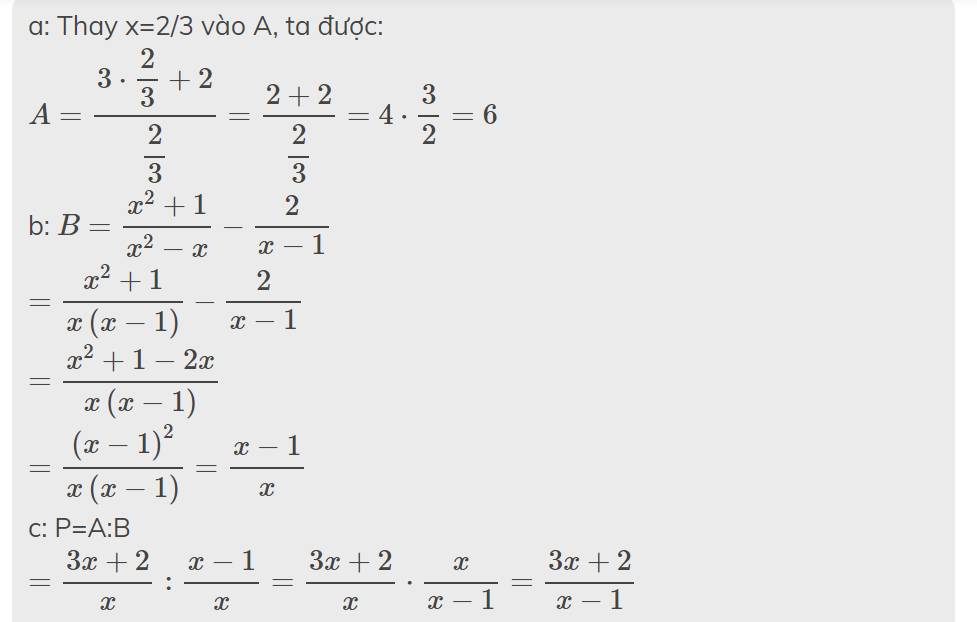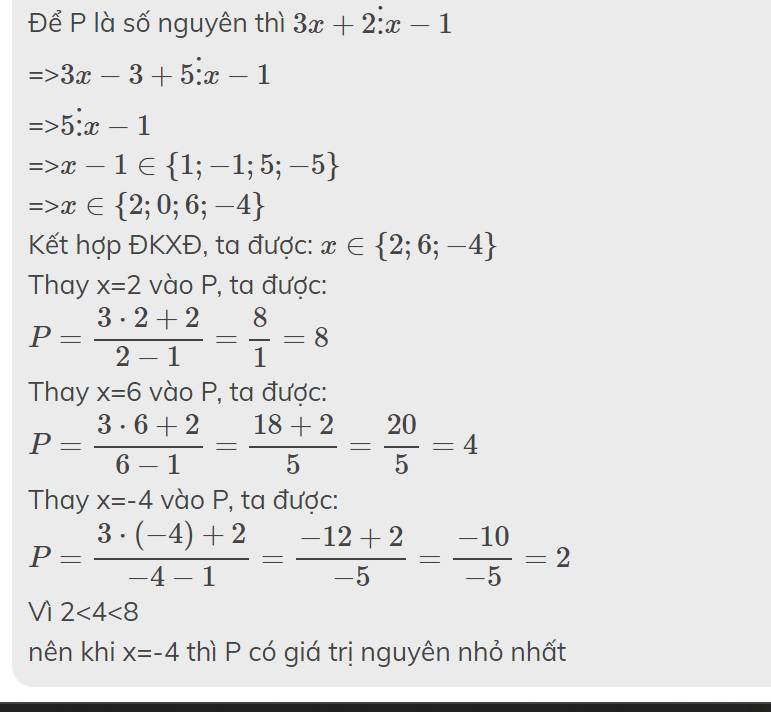Hãy nhập câu hỏi của bạn vào đây, nếu là tài khoản VIP, bạn sẽ được ưu tiên trả lời.

Bài 2:
\(A=\left(x+y\right)^3-3xy\left(x+y\right)+3xy=1^3-3xy+3xy=1\)
Bài 3:
\(M=x^6-x^4-x^4+x^2+x^3-x\)
\(=x^3\left(x^3-x\right)-x\left(x^3-x\right)+\left(x^3-x\right)\)
\(=8x^3-8x+8\)
\(=8\cdot8+8=72\)

a: Khi x=1 thì\(P=\dfrac{1-2}{1+2}=\dfrac{-1}{2}\)
b: \(=\dfrac{3x+6+5x-6+2x^2-4x}{\left(x-2\right)\left(x+2\right)}=\dfrac{2x^2+4x}{\left(x-2\right)\left(x+2\right)}=\dfrac{2x}{x-2}\)
c: \(P=A\cdot B=\dfrac{2x}{x-2}\cdot\dfrac{x-2}{x+1}=\dfrac{2x}{x+1}\)
\(P-2=\dfrac{2x-2x-2}{x+1}=\dfrac{-2}{x+1}\)
P<=2
=>x+1>0
=>x>-1

rút gọn biểu thức
a) \(4x^2-\left(x+3\right).\left(x-5\right)+x\)
\(=4x^2-\left(x^2-5x+3x-15\right)+x\)
\(=4x^2-x^2+5x-3x+15+x\)
\(=3x^2+3x+15.\)
b) \(x.\left(x-5\right)-3x.\left(x+1\right)\)
\(=x^2-5x-\left(3x^2+3x\right)\)
\(=x^2-5x-3x^2-3x\)
\(=-2x^2-8x.\)
d) \(\left(x+3\right).\left(x-1\right)-\left(x-7\right).\left(x-6\right)\)
\(=x^2-x+3x-3-\left(x^2-6x-7x+42\right)\)
\(=x^2-x+3x-3-x^2+6x+7x-42\)
\(=15x-45.\)
Chúc bạn học tốt!

a: Thay x=2/3 vào A, ta được:
\(A=\dfrac{3\cdot\dfrac{2}{3}+2}{\dfrac{2}{3}}=\dfrac{2+2}{\dfrac{2}{3}}=4\cdot\dfrac{3}{2}=6\)
b: \(B=\dfrac{x^2+1}{x^2-x}-\dfrac{2}{x-1}\)
\(=\dfrac{x^2+1}{x\left(x-1\right)}-\dfrac{2}{x-1}\)
\(=\dfrac{x^2+1-2x}{x\left(x-1\right)}\)
\(=\dfrac{\left(x-1\right)^2}{x\left(x-1\right)}=\dfrac{x-1}{x}\)
c: P=A:B
\(=\dfrac{3x+2}{x}:\dfrac{x-1}{x}=\dfrac{3x+2}{x}\cdot\dfrac{x}{x-1}=\dfrac{3x+2}{x-1}\)
Để P là số nguyên thì \(3x+2⋮x-1\)
=>\(3x-3+5⋮x-1\)
=>\(5⋮x-1\)
=>\(x-1\in\left\{1;-1;5;-5\right\}\)
=>\(x\in\left\{2;0;6;-4\right\}\)
Kết hợp ĐKXĐ, ta được: \(x\in\left\{2;6;-4\right\}\)
Thay x=2 vào P, ta được:
\(P=\dfrac{3\cdot2+2}{2-1}=\dfrac{8}{1}=8\)
Thay x=6 vào P, ta được:
\(P=\dfrac{3\cdot6+2}{6-1}=\dfrac{18+2}{5}=\dfrac{20}{5}=4\)
Thay x=-4 vào P, ta được:
\(P=\dfrac{3\cdot\left(-4\right)+2}{-4-1}=\dfrac{-12+2}{-5}=\dfrac{-10}{-5}=2\)
Vì 2<4<8
nên khi x=-4 thì P có giá trị nguyên nhỏ nhất

a)Trong biểu thức A có (3-x)^2=(x-3)^2 nên ta có:
\(A=\left(2x+1\right)^2+2\left(2x+1\right)\left(x-3\right)+\left(x-3\right)^2=\left(2x+1+x-3\right)^2=\left(3x-2\right)^2\)
\(B=\frac{1-4x}{\left(4x-1\right)\left(3x-2\right)}=-\frac{4x-1}{\left(4x-1\right)\left(3x-2\right)}=\frac{-1}{3x-2}\)
b)Thay x=1/3 vào biểu thức A ta có:
\(A=\left(3.\frac{1}{3}-2\right)^2=\left(1-2\right)^2=\left(-1\right)^2=1\)
c)\(A.B=\left(3x-2\right)^2.\frac{-1}{3x-2}=-\frac{\left(3x-2\right)^2}{3x-2}=-\left(3x-2\right)=2-3x\)



a: \(B=\left(\dfrac{3x+6}{\left(x-3\right)\left(x+3\right)}-\dfrac{2}{x-3}\right):\dfrac{1}{x+3}\)
\(=\dfrac{3x+6-2x-6}{\left(x-3\right)\left(x+3\right)}\cdot\dfrac{x+3}{1}=\dfrac{x}{x-3}\)
b: \(P=A\cdot B=\dfrac{x}{x-3}\cdot\dfrac{x-3}{x^2-x+1}=\dfrac{x}{x^2-x+1}\)